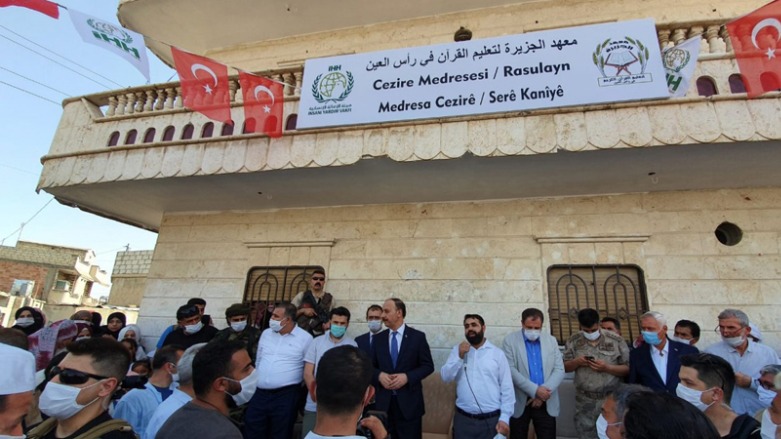Turkish-backed NGOs turn seized properties of Syrian Kurds into mosques, madrasas: reports
In late June, a Turkish governor attended an inauguration ceremony for the opening of madrasas in a town in northern Syria, set up on properties seized from Kurdish owners.

ERBIL (Kurdistan 24) – As international criticism continues over Ankara’s conversion of Byzantine-era churches into mosques inside Turkey, Syrian humanitarian organizations are expressing concerns about Turkish-backed groups allegedly seizing properties of Kurdish citizens to set up mosques or madrasas in Syria.
According to a report by Syrians for Truth and Justice (STJ) published on August 11, the Turkish Humanitarian Relief Foundation (IHH), a non-governmental organization (NGO), has turned two Kurdish-owned houses into madrasas, Islamic learning centers. The properties are located in Serekaniye, a town in northern Syria occupied by Turkey and its proxy militias in an October 2019 cross-border assault.
The Turkish Governor of Urfa, Abdullah Erin, attended the inauguration ceremony for the opening of the two facilities on June 23.
Founded in 1992, IHH says it has no political or ideological affiliations. However, civil society groups and analysts have accused it of links to militant organizations and Islamist movements across the region.
The two houses belonged to the family of the Kurdish journalist Muhyedin Isso, who now resides in Germany.
“Months ago, I learned that Quran teaching courses are held in our seized house,” Isso told STJ. He explained that he had seen videos of the conversions on June 23 on social media, noting that one of the houses “belongs to my father and the other to my brother.” Isso added that the facilities, named Al Jazeera and Al Fateh, which he termed as “Quran institutes,” were erected “without our permission or even our knowledge.”
A day after the inauguration, the journalist claimed, a member of the now Turkish-backed Serekaniye council, Issa al-Bunni, contacted his father and “asked him to sign a document stating that he voluntarily gave up the house.”
According to Isso, the Ankara-aligned official, Bunni, pressured his father to give up the house. “My father, however, refused to sign that document and told them to get out of his house.”
Isso’s father currently resides in Turkey after being displaced from Serekaniye, also known as Ras al-Ayn in Arabic, due to Ankara’s so-called Operation Peace Spring in late 2019.
Bunni, who is also a representative of the IHH, has told the online publication Syria Report that the IHH had agreed with armed factions to evacuate some houses in territories they control, refurbish them, and rent them out to “organizations working for the public good.”
According to Bassam al-Ahmad, the executive director of STJ, this is not an isolated case, as he said that Turkish-backed groups have carried out more human rights violations in cities like Afrin, a Kurdish-majority area Turkish forces occupied in March 2018.
“But in this case, we documented it, because the owner of the house accepted to speak to us and show how the local council is involved,” he told Kurdistan 24.
In another instance in Afrin, the IHH announced on July 25 that they “laid the foundation of the Afrin Zakirin Grand Mosque, where 1,500 people can worship together.”
Reports revealed that “The Association for Living with Dignity - Palestinian Arabs 48 has seized lands in Tel Tawil village, owned by a Kurdish citizen from Ashounah, in Balbul district in Afrin, intending to build a mosque there without obtaining the owner approval. pic.twitter.com/adMQJIl2ei
— VdC-NsY \ Northern Syria (@vdcnsy) July 27, 2020
It’s unclear if the mosque was built with permission of the land’s owners nor if there was a need for more mosques in Afrin.

IHH workers cleaned one mosque to make it available for worship in March 2018.
Furthermore, reports have emerged claiming that a Palestinian NGO called “Association for Living with Dignity for the 48 Palestinians” funded Turkish NGO Beyaz Eller to construct a mosque in the Tal Tawil village in Afrin.
According to the Kurdish news website Afrin Post and the Violation Documentation Center, the land was seized from a Kurdish citizen from Afrin. However, the Turkish NGO responded to criticism by claiming that the property was donated by “one of the Kurdish brothers.”
However, the NGO did not provide any proof of this claim.
Sinam Mohamed, the representative of the Syrian Democratic Council (SDC) in Washington, who is originally from Afrin, told Kurdistan 24 that they are against seizing of any properties, whether Yezidi’s, Muslims, or Christians, to build religious places of worship.
“How can you occupy someone’s house while this person is displaced in a camp, or a refugee abroad?” Mohamed said. She noted further that there are documented cases of houses of the Yezidi minority being turned into mosques in Afrin.
“This is against the principles of Islam," as well as "the principle of freedom of religion,” Mohamed stated.
The US State Department has earlier also expressed concerns over reports of abuses by Turkish-backed armed groups, including the “seizure of and resettlement of new populations in private properties.”
This also included reports of abuses in Afrin, such as “the desecration of several Yezidi shrines, kidnapping for ransom of Yezidi and Kurdish women, and looting and vandalizing of homes and archaeological sites.”
Editing by Khrush Najari